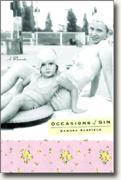Sandra Scofield
book reviews:
· general fiction
· chick lit/romance
· sci-fi/fantasy
· graphic novels
· nonfiction
· audio books
· author interviews
· children's books @
curledupkids.com
· DVD reviews @
curledupdvd.com
newsletter
win books
buy online
links
home
for authors
& publishers
for reviewers

 |
Occasions of Sin: A Memoir Sandra Scofield W.W. Norton Hardcover 288 pages January 2004 |
|
As a young child, Sandra Scofield has a vague sense of the boundaries between her mother and herself, but Edith Hupp does not have such a clear perspective. She treats her malleable young daughter almost more as companion than as a child. Thanks to Edith, the child feels different from others, not bound by the same rules. Years later, after her mother’s death, Scofield describes herself as “navigating chaos without any reliable compass.”
Often the impressionable minds of little girls are given to excessive drama and exaggeration, especially when fed on a steady diet of religious fervor. I recall having the same distorted thought process and approach to praying, as if God was mine alone: a basic misunderstanding of the nature of prayer. In the confusion, God becomes Prince Charming, to “rescue you not from death, but from anonymity." There is, as well, the particular innocence of the 1950’s, especially for Catholic girls. Most of Scofield’s formative years are solitary, spent in hours of thorough convent education, along with intermittent visits to an ever-more sickly mother. Through this distorted framework, the young girl is unable to formulate an accurate picture of the world. A distant father and a grandmother often at odds with her daughter do little to alleviate the child’s loneliness. There is no one to inject reality into Sandra’s perceptions. When her mother finally dies from chronic nephritis after years of hospital stays and shock treatments, Scofield has no basis for structuring a life that serves her best interests. After a traumatic incident that strips away her innocence, soon after Edith dies, Scofield’s already shaky persona is shattered, and so ends the memoir. The author fails to address her life after the experience, although she is writing as a mature woman. The memoir is decidedly purgative, but there is no way to ascertain the author’s success in adulthood. Like many young girls confused by a dysfunctional home life and excessive religious instruction, the sheltered existence has only served to cripple Sandra in her dealings with the world at large. Occasions of Sin is a portrayal of Scofield’s life, Part One, but the memoir begs completion to be instructive to others attempting to navigate such dangerous waters. Has Scofield survived the past and created a more balanced life? Or is she forever haunted by the distortion of perceptions that ruled her early years? I am, finally, unsatisfied. The author has made peace with her past, but has she found contentment with the present? © 2004 by Luan Gaines for Curled Up With a Good Book |
|
|
|
 Click here to learn more about this month's sponsor! |
|
| fiction · sf/f · comic books · nonfiction · audio newsletter · free book contest · buy books online review index · links · · authors & publishers reviewers |
|
| site by ELBO Computing Resources, Inc. | |
 The whole family -- mother, father and two daughters -- are living with the maternal grandmother during the early years of Edith’s illness. Both Edith and Sandra convert to Catholicism, forming another strong bond between them. Sandra is captivated by the legends and rituals of Catholicism and, with a child’s innocent zeal, dedicates her days to emulation of the saints. The unfolding tragedy of Edith’s long journey toward death has a profound effect on the child who develops a number of nervous habits and prays incessantly. Shrouded by her naiveté, Sandra fervently hopes her prayers will keep her mother alive.
The whole family -- mother, father and two daughters -- are living with the maternal grandmother during the early years of Edith’s illness. Both Edith and Sandra convert to Catholicism, forming another strong bond between them. Sandra is captivated by the legends and rituals of Catholicism and, with a child’s innocent zeal, dedicates her days to emulation of the saints. The unfolding tragedy of Edith’s long journey toward death has a profound effect on the child who develops a number of nervous habits and prays incessantly. Shrouded by her naiveté, Sandra fervently hopes her prayers will keep her mother alive.